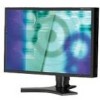NEC LCD2490WUXI-BK User Manual - Page 35
Ergonomics, Cleaning the LCD Panel, Cleaning the Cabinet
 |
UPC - 805736016413
View all NEC LCD2490WUXI-BK manuals
Add to My Manuals
Save this manual to your list of manuals |
Page 35 highlights
Recommended Use - continued Ergonomics To realize the maximum ergonomics benefits, we recommend the following: • Adjust the Brightness until the background raster disappears. • Do not position the Contrast control to its maximum setting. • Use the preset Size and Position controls with standard signals. • Use the preset Color Setting. • Use non-interlaced signals with a vertical refresh rate more than 60Hz. • Do not use primary color blue on a dark background, as it is difficult to see and may produce eye fatigue to insufficient contrast. For more detailed information on setting up a healthy work environment, write the American National Standard for Human Factors Engineering of Visual Display Terminal Workstations - ANSI-HFS Standard No. 100-1988 - The Human Factors Society, Inc. P.O. Box 1369, Santa Monica, California 90406. Cleaning the LCD Panel • When the liquid crystal panel becomes dusty or dirty, wipe gently with a soft cloth. • Do not rub the LCD panel with hard or coarse material. • Do not apply pressure to the LCD surface. • Do not use OA cleaner as it will cause deterioration or discolor the LCD surface. Cleaning the Cabinet • Unplug the power supply. • Gently wipe the cabinet with a soft cloth. • Dampen a cloth with a neutral detergent and water, wipe the cabinet and then dry with a soft cloth. NOTE: Many plastics are used on the surface of the cabinet. DO NOT clean with benzene, thinner, alkaline detergent, alcoholic system detergent, glass cleaner, wax, polish cleaner, soap powder, or insecticide. Do not place rubber or vinyl against the cabinet for long periods. These types of fluids and fabrics can cause the paint to deteriorate, crack, or peel. 32















